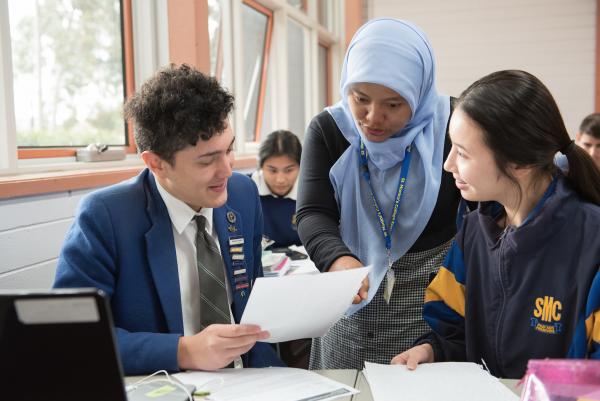Throughout my years in school, I was an excellent student, but always felt uncomfortable with the institution itself. In my eyes, the best way to learn is to experience new things, to travel, to talk to new people and challenge yourself. Although in many ways valuable, school can sometimes constrict the mind rather than expanding it.
That's part of the reason I opted out of university and became a waitress instead. I learned about life hands-on, rather than discussing it in a classroom first.
Needless to say, I never thought I'd become an English teacher.
When I returned to Cambodia, I had the option keep working in restaurants, the pay was so low that I would be forced to go work outside of the country for a few months in order to afford to live here for an extended period of time. Teaching became the obvious choice. in a city full of international schools, teaching jobs are easy to come by for young native English speakers. Siem Reap relies so heavily on tourism, that English skills are highly sought.
After applying to many hotel and restaurant jobs and only a handful of teaching positions, I was offered a job at an elementary school in town that boasts an American curriculum. Even though I never went to college, have no certificates and have very limited teaching experience, I was hired for 1st, 2nd, and 3rd grades.
Now that I have gotten into the rhythm of being a teacher, I really enjoy it. Not only do I feel healthier than when I bartended at night and slept until the early afternoon, but I feel generally more motivated and accomplished.
I wake up, have a quick breakfast and coffee, and walk 30 minutes through town to school. During the regular school year I taught four hours in the morning and then two in the afternoon, but now for summer school I teach only from 7:30 a.m. until 11:30 a.m. I enjoy the challenge of lesson planning and coming up with creative activities to help students learn and practice new concepts in English.
Despite the exhaustion that hits as soon as I come home from work, I also enjoy spending time with the kids and playing and laughing with them. Cambodian children are happy and full of energy, and some of the most empathetic people I have ever been around. One child, after seeing me walk home from school, told me that he wanted to make a lot of money and buy me a scooter so I wouldn’t have to walk so far each day. One young girl insisted on coming to my classroom to pick up my backpack and water bottle and carry them to the next class, another gave me part of her snack each morning. All the traits I admire about Cambodian people—like generosity—I see developing in the children.
All the traits I admire about Cambodian people—like generosity—I see developing in the children.
As fun as this new job is, it is also accompanied by unique challenges. There are days when the children act up and I have to raise my voice—something I don’t feel so comfortable doing. These days exhaust me emotionally and I arrive home totally drained.
Cultural differences are hard to navigate, too, especially as I begin to understand how Cambodian students learn. In their Khmer classes, kids are given long passages to memorize and books about traditional values to read. Their teachers are strict and the workload is heavy. In my classes, I struggle to get the kids to be creative. Often, I will give them a game or an exercise that is completely open to their imaginations, but they would rather have me tell them what to write or draw. One child asked me if it was ok to colour a carrot blue instead of orange!
Poverty also affects the classroom. The school where I work is fairly modern, with air-conditioning, a library, computer room, offices, and everything you could need, but the classrooms are not what you would find in the Western world. The rooms are basic concrete cells, many without windows, with only a teacher’s desk, a whiteboard, and chairs for the students. The first graders sit in tiny colourful plastic seats. The rooms are often dirty, the playground just a concrete floor with some lines on it and one basketball hoop. While many of the children who attend the school come from fairly wealthy families (as the school is expensive to attend), several are sponsored by NGOs and have only one dirty uniform and a pair of shoes that is coming apart. When I ask them why they didn’t do their homework they reply: “I have no money for the workbook.” I struggle to figure out how to include these children and how to make lessons fun when the kids are in a room with no windows.
Although I don’t see myself teaching long-term, I am grateful for this job and all of the lessons it is teaching me. I am grateful for the hugs I get from the children and the excited shouts of “Teacher Zanny!” (which has been shortened to “Teacher!” then “Teacha!” then just “Cha!”) when my students see me. Most of all, I am grateful for the opportunity to let out my inner child (playing tag and hangman and having paper airplane contests) and reconnect with the excitement of life with these young Cambodians.
Add this article to your reading list




